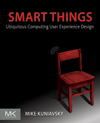I'm reading a fascinating paper right now called Social Origin of Good Ideas (PDF) by University of Chicago professor Ronald S. Burt. It's an analysis of how, to paraphrase, exposure to different fields creates the opportunities for good ideas and how that makes people more successful. His research is thorough, readable, appropriately interdisciplinary and it's a fascinating application of social network analysis. Most important, however, is that it validates my dilletantism. ;-) Here's a chunk of the abstract, which describes the gist of the paper:
The hypothesis is that people who live in the intersection of social worlds are at higher risk of having good ideas. Qualifications come immediately to mind, but the gist of the hypothesis is familiar in sociology and makes intuitive sense: ways of thinking and behaving are more homogenous within than between groups, so people connected to otherwise segregated groups are more likely to be familiar with alternative ways of thinking and behaving, which gives them the option of selecting and synthesizing alternatives. I describe anecdotal and aggregate evidence consistent with the hypothesis, but my goal in this paper is to study the hypothesis in finer detail, at the level of individuals, to talk about ideas as a catalyst for the performance effects of social capital.
I saw this referenced in Strategy + Business magazine, but I find it interesting that the study of multidisciplinary thought and social networks is starting to filter through to the popular media. Social networks, of course, have been a big meme since Friendster broke, but the interdisciplinary nature of the current intellectual environment is a relatively new thing, I think. I've had a bunch of conversations lately about it with Ben, Danah, Molly and the rest of the usual intelligentsia (and, for the record, I'm not going to let the topic fold in on itself--yes, my social network of interdisciplinary intellectuals is dicussing social networks of interdisciplinary intellectuals, move along), so it's probably an interesting thing.
Where this current interest comes from? For those of us who grew up in the rampant relativism of the 70s and 80s there's a kind of intellectual vertigo. I've often heard people talk about being starved of anchors of certainty in their lives. The ephemeral nature of Internet work (maybe modern creative work in general) only serves to reinforce it, forcing people to seek ever more extreme ways of grounding (Burning Man? knitting?). Lately, interdisciplinary ideas seem to have escaped places like the Santa Fe Institute and the Global Business Network to become more generally popular. TED-like conferences and university programs seem to have appeared much more frequently than I remember 10 years ago. Maybe this is the escape that people have found from the anxieties of perennial doubt? Narrowly-focused Modernist certainty (which extended from narrow job definitions to the coining and following of successive art movements) was undermined and followed by an age of ever-deeper uncertainty (i.e. the 70s and 80s), which was deeply anxiety-inducing. But maybe the end of the Cold War inspired enough optimism that people managed to look for and find a new kind of anchor by looking in several places at once? Maybe the Web resonated with this need and accellerated it? Or maybe I'm just projecting justifications? (I'm certainly rambling.... ;-)
Maybe. For now, it's interesting to see that someone is studying it.




Hear Hear!
Bring back the True Meaning of Dilletante AND Amateur. While we're at it, Bricoleur, too!
Good find. And none too soon. Err, actually this is not news to anybody I hang out with. Hell, it's why we started our company 3+ years ago... cultural anthropologists+architects+marketing+finance geeks = Alchemy. Cute huh?